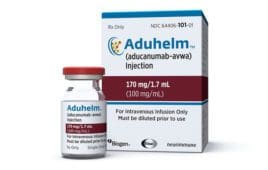 Lilly’s (NYSE:LLY) shares were up more than 5.36% to $425.88 after the company announced upbeat results from the phase 3 TRAILBLAZER-ALZ 2 study, which revealed that the experimental Alzheimer’s drug donanemab significantly slowed cognitive decline in patients with early symptomatic Alzheimer’s disease at 18 months.
Lilly’s (NYSE:LLY) shares were up more than 5.36% to $425.88 after the company announced upbeat results from the phase 3 TRAILBLAZER-ALZ 2 study, which revealed that the experimental Alzheimer’s drug donanemab significantly slowed cognitive decline in patients with early symptomatic Alzheimer’s disease at 18 months.
Almost half of patients, 47%, who received donanemab had no disease progression one year after treatment began, compared with 29% who did not receive the investigational antibody. Donanemab recipients had a clinical decline of 35% compared to placebo recipients based on the primary outcome measure. The drug group had 40% less decline in the ability to perform activities of daily living.
A potential blockbuster
Donanemab seems likely to win FDA approval given the positive data. In September 2022, UBS projected that donanemab would generate peak risk-adjusted sales of $4.8 billion. But earlier this year, FDA sent Lilly a complete response letter for the accelerated approval submission for the drug. Lilly said then that it expected data from the TRAILBLAZER-ALZ 2 study would be ready by the middle of 2023, clearing the way for a submission for traditional FDA approval.
Lilly initially planned on filing the submission for the drug in the first quarter of 2023.
The TRAILBLAZER-ALZ 2 study sought to evaluate the safety and efficacy of donanemab in participants between the ages of 60 and 85 years with early symptomatic Alzheimer’s disease. The patient population included those with mild cognitive impairment (MCI) or mild dementia due to Alzheimer’s. In all, Lilly enrolled 1,736 participants in the study, with selection based on cognitive assessments, amyloid plaque imaging and tau staging by PET imaging.
In the placebo-controlled study, donanemab demonstrated a significant slowing of cognitive decline in both the intermediate tau population and the combined intermediate and high tau population.
Statistical analyses used in TRAILBLAZER-ALZ 2
Lilly used two statistical analyses, the mixed model for repeated measures (MMRM) and natural cubic spline (NCS), to gauge the significance of these results. The MMRM measures the effect of a treatment on patients over time. The NCS models the relationship between patients’ response to a treatment and their baseline characteristics.

- These efficacy measures were obtained at 18 months comparing the decline in intermediate-tau participants treated with donanemab compared to those treated with a placebo. The mixed-effects model repeated measures (MMRM) and null change score (NCS) groups are compared using error bars representing the p-values. MMRM is a statistical method used to analyze longitudinal data. NCS refers to a control group that assumes no change in disease progression over time.
To further ensure the accuracy of the results, Lilly used P-values to provide a measure of the evidence against a null hypothesis, which assumes there is no relationship between two groups or variables. In the heatmap below, darker shades represent smaller p-values, indicating a stronger relationship between the endpoint and the statistical analysis method. Lighter shades reflect larger p-values, which indicate a weaker or less certain relationship than darker shades.

- Comparison of p-values for various endpoints in TRAILBLAZER-ALZ 2 phase 3 study.
The y-axis of this heat map below shows the endpoints in the study including the Integrated Alzheimer’s Disease Rating Scale (iADRS), Clinical Dementia Rating Scale Sum of Boxes (CDR-SB), Alzheimer’s Disease Cooperative Study-Activities of Daily Living (ADCS-iADL) and Alzheimer’s Disease Assessment Scale-cognitive subscale 13 (ADAS-Cog13). The x-axis shows statistical analysis methods using p-values and tau.
The slow uptake of the Alzheimer’s drug aducanumab from Biogen (Nasdaq:BIIB) and Eisai related to the quality of the evidence used to grant accelerated approval to that therapy in 2021. A number of experts, including an independent FDA advisory panel, concluded that the aducanumab clinical-trial data did not conclusively demonstrate that the drug could slow cognitive decline. Additionally, the Institute for Clinical and Economic Review (ICER) concluded that the evidence is insufficient to demonstrate a net health benefit of aducanumab for patients with Alzheimer’s disease. In contrast, the TRAILBLAZER-ALZ 2 data is statistically convincing, providing strong evidence against the null hypothesis and suggesting that donanemab is effective in slowing cognitive decline.
Filed Under: Neurological Disease, Psychiatric/psychotropic drugs





Tell Us What You Think!
You must be logged in to post a comment.